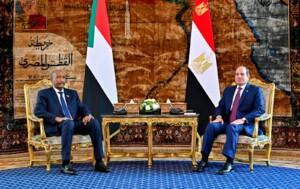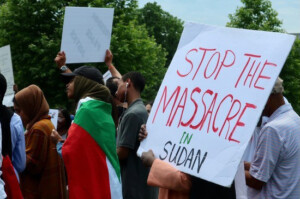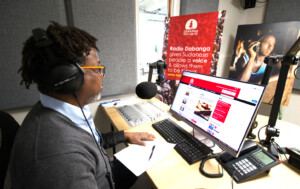‘All women are represented’ in Sudan peace agreement
The main beneficiaries of the Juba Peace Agreement will be women living in conflict and marginalised areas in Sudan, says Fawateh El Nur, member of the peace negotiations committee of the Sudan People’s Liberation Movement-North faction headed by Malik Agar (SPLM-N Agar) in Blue Nile state.
 (Albert Gonzalez Farran / UNAMID)
(Albert Gonzalez Farran / UNAMID)
The main beneficiaries of the Juba Peace Agreement will be women living in conflict and marginalised areas in Sudan, says Fawateh El Nur, member of the peace negotiations committee of the Sudan People’s Liberation Movement-North faction headed by Malik Agar (SPLM-N Agar) in Blue Nile state.
According to El Nur, Member of the Tripartite Committee for the Implementation of the Humanitarian Issues Agreement and the official spokesperson for the Security Arrangements Committee during the peace negotiations in the South Sudanese capital of Juba, women in these areas are most in need of peace. They have lost their husbands and children to the war and have become the head of the family and the breadwinner.
Because of the war, girls did not have access to education. “The war also led to the marriage of minors, meaning marriage at a very early age due to the lack of any opportunities for women in war zones”.
In an interview with Radio Dabanga's Kandaka programme, broadcast on Thursday, El Nur said that all SPLM-N Agar women, “wherever they live, in camps for the displaced, in refugee camps, or in war zones, are happy with the agreement and say that the agreement will provide us with representation and a decent life”.
The government and most armed movements in Sudan signed the peace agreement last weekend. All major armed movements in Sudan are involved in the peace agreement, except Sudan People’s Liberation Movement-North led by Abdulaziz El Hilu (SPLM-N El Hilu*) in South Kordofan and parts of Blue Nile state and the mainstream Sudan Liberation Movement under the leadership of Abdelwahid El Nur (SLM-AW**).
The signing ceremony was witnessed by a number of heads of state and governments, and representatives of the African Union and the United Nations.
Addressing all issues
She added that the agreement does not ignore women “as it is rumoured”, but rather addresses all women’s issues “from the causes of the marginalisation to enhancing their capabilities through education for themselves and their children”.
This opens space for women to rely on themselves, she said, indicating that organizations will contribute to rehabilitation, training, and economic empowerment. This will also mitigate the chances of war breaking out again, she said, referring to United Nations Security Council Resolution 1325.
She also stated that peace contributed to the return of families to their original areas. “It happened that families were literally divided by the war, one part was living in areas freed by the movement, and the other part in government-controlled areas. The opening of the routes in Blue Nile state contributed to the return of the displaced and refugees to their families they did not see for 10 years.”
The agreement will also help ensure delivery of aid to the displaced, restore traffic, and provide treatment for those affected by the consequences of war.
Participation
On the participation of women in the peace process, she said that the SPLM-N Agar women were just like men in the negotiations. “We demanded fair representation and our participation was real and not fake,” she said.
“We were also successful in getting Resolution 1325 inserted in the Constitutional Document.”
The women also managed to raise the percentage of women in all levels of government in Sudan to 40 per cent. The priority for women now is psychologically overcoming the consequences of war, social integration, return for the displaced, services and education, eliminating differences between various groups, and stability, according to El Nur, “in addition to any other things that will contribute to enhancing job opportunities.”
As for compensation, she emphasised that the agreement dealt with the causes of material and in-kind compensation. The representative of the peace agreement will compensate all people who lost their money and housing. Compensation will also be provided for missing persons.
“The time has come to bridge the gap between the women in the centre of the country and the marginalised women in the peripheries”, said El Nur at the end of the interview. She appealed to all women to come together and especially help those in conflict areas.
Listen to Thursday's broadcast of Kandaka (in Arabic) here
Radio Dabanga’s editorial independence means that we can continue to provide factual updates about political developments to Sudanese and international actors, educate people about how to avoid outbreaks of infectious diseases, and provide a window to the world for those in all corners of Sudan. Support Radio Dabanga for as little as €2.50, the equivalent of a cup of coffee.













 and then
and then